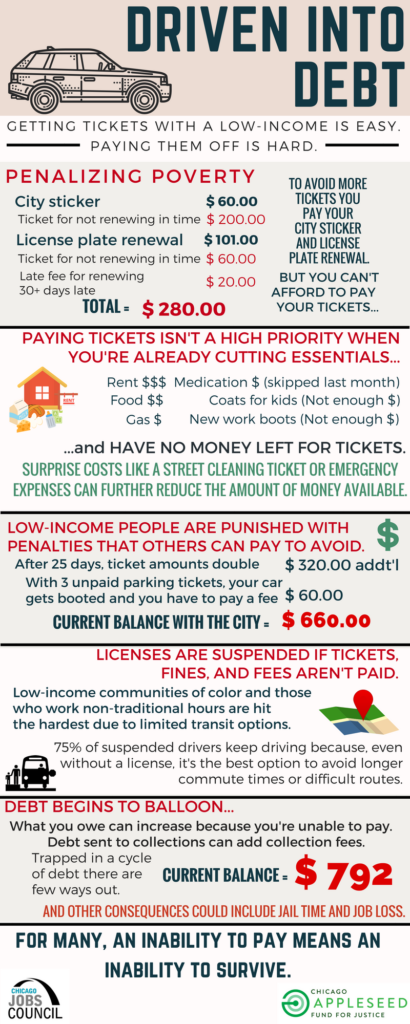Driven Into Debt: The Importance of Reforming Wealth-Based Driver’s License Suspension
On May 7, 2018, Chicago Appleseed and our partners in the Working Group on Court Costs, Fines, and Fees released our policy positions on criminal court fines, fees, and costs. Using impact data and research, the Working Group developed a list of policy commitments aimed at mitigating the impact of court assessments on low-income individuals and communities. The commitments emphasize that people shouldn’t be penalized for their poverty by being punished for their inability to pay court costs, fines, and fees and shouldn’t face barriers to reentry as a result of the debt they owe.
One way through which people become trapped in a cycle of debt and court-involvement is through the suspension of their driver’s licenses because they cannot afford to pay tickets, including tickets for non-moving violations such as parking tickets. As part of our court costs, fines, fees work, Chicago Appleseed has been working with the Transit Table[1] to address the effects of license suspension on low-income people, primarily through our support of the License to Work Act.

License suspensions ensnare low-income people in a cycle of poverty by limiting job seekers in their ability to provide for their families, earn money to reinstate their licenses, and even through jail time for charges of driving on a suspended license. Driver’s licenses are vital for employees who work non-traditional hours or who lack access to other modes of transportation. For people in many rural and some urban parts of Illinois, transportation options are very limited. Driving is thus crucial to maintaining any kind of quality of life. If driver’s licenses are suspended, low-income individuals face increased difficulty in earning income to make ends meet while simultaneously being required to pay off tickets or fees in order to reinstate their licenses. Some people will have no other option but to continue driving to drop off their children at school, get groceries, attend court appearances, and get to work. Yet the imposition of additional fines and fees for driving on a suspended license only worsens the problem by increasing the amounts that people owe and making full payment and reinstatement even less attainable.
In our research, Chicago Appleseed observed how commonly people are trapped in the criminal justice system as a result of their inability to pay traffic debts—even if they have satisfactorily completed all other court requirements. Low-income people are penalized for their inability to pay through payment plans with high-interest rates that increase the total amounts owed and also through the extension of court supervision. Of 197 court-involved people surveyed by Chicago Appleseed, 34% reported having their driver’s license suspended for failure to pay court costs, fines, or fees. Forty-five percent of people with incomes less than $15,000 (42 of 93 people surveyed), said that they had their licenses suspended for failure to pay court costs, fines, and fees. License suspensions can make it that much more difficult to get out from under court and traffic debt by making it nearly impossible for job seekers to obtain and maintain employment.
Chicago Jobs Council and Chicago Appleseed have partnered to create this infographic that outlines how license suspensions can be destructive for low-income families. Driver’s licenses play a vital role in helping individuals get their lives back on track and exit the court system. Passing the License to Work Act is one way to ensure that people who are trying to meet their obligations to society, while supporting themselves and their families, are able to do so. The License to Work Act is currently in the Illinois Senate. Our partners will need help to pass it out of the Senate, and eventually the House. Follow Chicago Jobs Council on Facebook for action alerts and updates on the status of the bill as we work towards joining states that have stopped the practice of penalizing poverty by suspending driver’s licenses simply for failure to pay.
